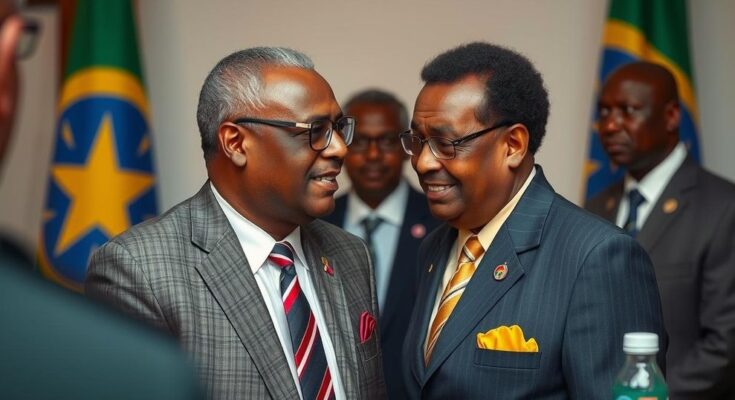Somalia’s President Hassan Sheikh Mohamud visited Ethiopia to strengthen relations after a recent peace agreement, which aims to ease tensions stemming from Ethiopia’s ambitions for maritime access. The visit reflects ongoing cooperation facilitated by Turkiye, yet unresolved issues persist regarding Ethiopia’s deal with Somaliland and regional dynamics involving Egypt and Eritrea opposing Ethiopia’s objectives.
The President of Somalia, Hassan Sheikh Mohamud, arrived in Ethiopia on Saturday as part of ongoing efforts to enhance diplomatic relations following a recent peace agreement. This visit, initiated at the request of Ethiopian Prime Minister Abiy Ahmed, aims to build upon the peace deal facilitated by Turkiye, which was signed last month as a means to alleviate tensions between the neighboring countries.
Historically, Ethiopia, being landlocked, has sought access to the sea, a desire that has fueled past grievances with Somalia. The situation escalated last year when Ethiopia acknowledged Somaliland’s independence in exchange for a strategic port and military base, causing significant outrage in Somalia. The recent peace agreement symbolizes a shift towards cooperation, though crucial issues remain unresolved regarding Ethiopia’s maritime aspirations and the status of its deal with Somaliland.
Additionally, tensions continue to manifest in regional affairs. On the same day as President Mohamud’s visit, Somalia’s Foreign Minister Ahmed Moalim Fiqi held discussions with his Egyptian and Eritrean counterparts in Cairo, where the three nations expressed a shared stance against Ethiopia’s ambitions. Egypt’s Foreign Minister Badr Abdelatty emphasized the importance of coastal nations maintaining autonomy over the Red Sea’s security, highlighting concerns over external military presence.
Furthermore, Egypt, Eritrea, and Somalia have recently formed a new alliance, indicating growing military collaboration, particularly in the context of combating insurgency through the African Union Support and Stabilization Mission in Somalia (AUSSOM). The developments reflect the complexities of the peace process and the precarious geopolitics of the Horn of Africa, as regional dynamics evolve amidst persisting uncertainties about the future of inter-state relations.
The Horn of Africa has long been marked by a complex interplay of historical grievances and geopolitical interests, particularly between Somalia and Ethiopia. Central to the recent tensions is Ethiopia’s landlocked status and its ambitions for maritime access, which have clashed with Somalia’s territorial concerns. A significant catalyst for discord occurred when Ethiopia entered into an agreement to recognize Somaliland’s independence, further complicating the diplomatic landscape. The peace efforts, mediated by Turkiye, are intended to stabilize and shift this fraught relationship towards a more cooperative framework while addressing lingering disputes.
In conclusion, President Hassan Sheikh Mohamud’s visit to Ethiopia represents a pivotal moment in seeking to strengthen diplomatic ties following a critical peace agreement. While the recent accord signifies a hopeful shift in relations, underlying complexities remain. Ongoing regional dynamics, particularly the collaboration between Egypt, Eritrea, and Somalia against Ethiopia, reflect the delicate balance of power in the Horn of Africa. As both nations navigate these intricate issues, the future of their partnership remains contingent upon resolving key outstanding concerns.
Original Source: www.arabnews.com




